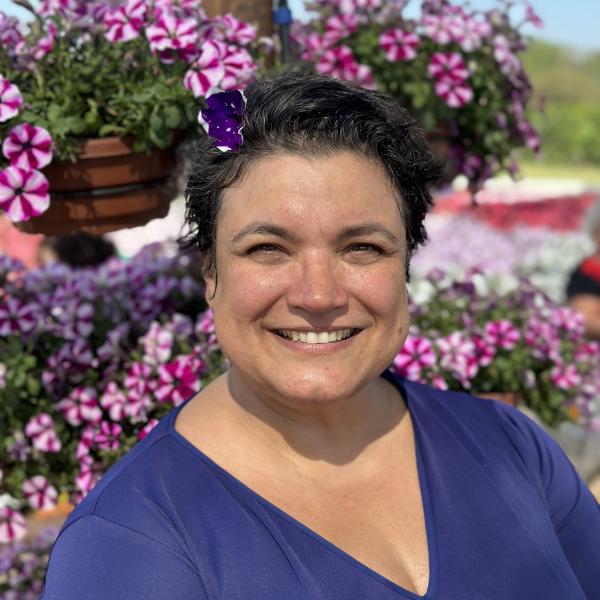
Biography
Danielle Mendes Thame Denny is a postdoctoral researcher in International Environmental Law at the University of São Paulo (USP/ESALQ), with a transdisciplinary focus that bridges legal studies, soil science, and climate governance. She holds a Ph.D. in International Environmental Law from the Catholic University of Santos, with a research fellowship at Yale University. She is a contributing author to Chapters 8 and 20 of the 7th Global Environment Outlook (GEO-7) by the United Nations Environment Programme (UNEP). Her research addresses the legal, political, and institutional dimensions of sustainable agriculture, with particular attention to nature-based solutions, climate law, and land governance in tropical regions.
The current research conducted by Danielle Mendes Thame Denny explores the regulatory, legal, and governance frameworks that shape the implementation of bioeconomy strategies aimed at mitigating greenhouse gas (GHG) emissions—specifically nitrogen, methane, and carbon—in agri-food systems. Particular emphasis is placed on the role of legal instruments in enabling the restoration of degraded pastures as a nature-based solution (NbS), highlighting the intersections between environmental law, climate governance, and agricultural policy.
The bioeconomy represents an opportunity for legal and regulatory systems to evolve toward more integrated models of environmental governance. This includes the design of legal instruments that internalize environmental externalities, regulate the sustainable use of biological resources, and incentivize ecosystem services through financial and fiscal mechanisms. In this context, pasture restoration is framed not merely as a technical intervention but as a legal and institutional challenge that depends on secure land tenure, enforceable environmental regulations, and policy coherence across sectors.
Recent normative advances in Brazil, such as Decree No. 11.815/2023, which establishes the National Program for the Conversion of Degraded Pastures (PNCPD), illustrate how pasture degradation is increasingly recognized as a structural issue with environmental, climatic, and socioeconomic implications. By linking restoration targets to Brazil’s Nationally Determined Contributions (NDCs) under the Paris Agreement, the decree incorporates NbS into the country’s international climate commitments.
This regulatory development is accompanied by complementary instruments such as the ABC+ Plan for low-carbon agriculture, the legal framework for carbon markets, green financing, and Payments for Environmental Services (PES). However, despite such progress, numerous barriers persist: fragmented jurisdictional authority, gaps in enforcement, regulatory uncertainty—particularly regarding public and collectively held lands—and the limited integration of environmental objectives into economic and trade policies.
Denny's work also investigates how public law can interface with private governance through the integration of voluntary sustainability standards—such as Bonsucro or Carne Carbono Neutro—into public procurement rules, environmental licensing, and agricultural credit schemes. These efforts seek to align market-based incentives with legally enforceable sustainability goals, fostering hybrid regulatory approaches that combine state authority with private accountability.
Furthermore, the research examines how constitutional principles—such as the social and environmental function of property, the precautionary principle, and intergenerational equity—can be translated into effective regulatory innovations. This includes the development of multilevel governance structures that engage federal, state, and local governments, while ensuring participatory legal frameworks for landowners, traditional communities, and rural producers.
By framing the bioeconomy within the broader contexts of international environmental law, climate change law, and transnational sustainability governance, this research contributes to the construction of a robust normative architecture capable of supporting the transition toward regenerative, low-carbon, and legally secure agri-food systems. Such integration is essential not only to achieving international environmental commitments but also to ensuring that the transformation of agricultural systems is both socially just and legally enforceable—directly supporting Sustainable Development Goals (SDGs 2, 6, 12, and 13).
Current Projects
One of the central components of this research is the critical assessment of Brazil’s Programa Nacional de Conversão de Pastagens Degradadas (PNCPD), established by Decree No. 11.815/2023. I analyze the program’s legal framework, funding mechanisms, and institutional coordination, while also exploring how it interacts with international agreements such as the Paris Agreement, the UNCCD, and the Global Biodiversity Framework.
In parallel, I coordinate stakeholder engagement efforts related to the implementation of Living Labs and field-based experimentation across Latin America and the Caribbean, as part of a broader research collaboration to adapt the EU Soil Mission to the LAC context. This work includes the development of governance models for participatory soil health strategies, as well as the design of open calls for experimental stations and collaborative platforms.
These projects aim to produce actionable knowledge that strengthens public policy design, fosters South–South cooperation, and supports Brazil’s emergence as a leader in ecological transition through innovative legal and institutional frameworks.
Research Interests
A key dimension of my work is understanding how legal systems, public policies, and governance mechanisms can enable or constrain the ecological transformation of land use, especially through the restoration of degraded pastures and the integration of sustainable practices in agriculture and livestock systems. I investigate how global frameworks—such as the Paris Agreement, the UN Convention to Combat Desertification (UNCCD), and the Kunming-Montreal Global Biodiversity Framework—are translated into national action and how they intersect with domestic law, fiscal instruments, and environmental regulation.
My research aims to support Brazil’s potential role as a global leader in ecological transformation, leveraging its vast natural resources, institutional capacity, and socio-environmental diversity. By promoting NbS and regenerative land management as strategic pillars for sustainable development, my work contributes to national and international efforts to reconcile food security, climate resilience, and biodiversity conservation.
Methodologically, I combine legal and policy analysis with participatory stakeholder research and institutional diagnostics, often in collaboration with researchers in soil science and environmental governance. Through this integrated approach, I seek to produce actionable knowledge that informs public debate, strengthens regulatory frameworks, and empowers multi-actor coalitions to mainstream NbS and soil health in Brazil and across Latin America.